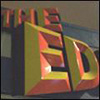RCT Discussion / Jungle/African area in a park i can look at?
-
 29-July 05
29-July 05
-

 Panic
Offline
It is about technique though Posix. I've talked to you a couple times about this on AIM. When I look at an X-sector or Fatha' or Turtleman park or, in fact, one by yourself, I'm never looking to replicate exact styles of building in my own work. I'm never planning to carry a certain exact arrangement of stone and brick textures into something I'm doing. The reason that people take inspiration from parkmakers is not to copy things by them, but to learn some technical expertise. To learn that it's generally not aesthetically great to have massive amounts of the same kind of tree all over the place with no other tree types at all. To learn that if you want to have a covered entrance to a building but one that is not inside a building, you can do the trick with path or coaster track and signs. It doesn't mean that because Fatha' made one using dark brown path and jungle signs that I'm going to do the exact same thing. It's just a set of tips from those better than oneself to use as general ideas to apply in one's own work, not specific strategies but just something to keep in the back of one's mind. Posix, I think you overestimate people's creative capabilities here. The person is few and far between who can create a technically difficult and breathtaking park in total isolation, without ever having viewed another one. We can't all live in caves. And more importantly, even if someone has an ultra-creative idea, if the technical skills and abilities are lacking then that person will not be able to stamp out what he wants, or what he sees in his head. I'm as gung-ho about parks and projects with big underlying creative ideas as you are. But what I've been trying to tell you is that I realize I can't pull off something like that until I have the technical skills to master it. And if that involves seeing how other people did things and taking general tips from that, then so be it. That's how society works, and that's how education works. Beethoven had music teachers. No one just handed him a sheet of staff paper when he was 10 and effectively locked him up, or else what he would have produced would have mostly sucked. Now, are you going to criticize him because the Ninth Symphony just happened to use a similar array of instruments to what Mozart used in his works? No, because otherwise it might not sound like a symphony at all, just a really big brass band. People like that have creative genius, but it takes technical lessons to be able to use those abilities to really achieve what one wants. The same goes for RCT.
Panic
Offline
It is about technique though Posix. I've talked to you a couple times about this on AIM. When I look at an X-sector or Fatha' or Turtleman park or, in fact, one by yourself, I'm never looking to replicate exact styles of building in my own work. I'm never planning to carry a certain exact arrangement of stone and brick textures into something I'm doing. The reason that people take inspiration from parkmakers is not to copy things by them, but to learn some technical expertise. To learn that it's generally not aesthetically great to have massive amounts of the same kind of tree all over the place with no other tree types at all. To learn that if you want to have a covered entrance to a building but one that is not inside a building, you can do the trick with path or coaster track and signs. It doesn't mean that because Fatha' made one using dark brown path and jungle signs that I'm going to do the exact same thing. It's just a set of tips from those better than oneself to use as general ideas to apply in one's own work, not specific strategies but just something to keep in the back of one's mind. Posix, I think you overestimate people's creative capabilities here. The person is few and far between who can create a technically difficult and breathtaking park in total isolation, without ever having viewed another one. We can't all live in caves. And more importantly, even if someone has an ultra-creative idea, if the technical skills and abilities are lacking then that person will not be able to stamp out what he wants, or what he sees in his head. I'm as gung-ho about parks and projects with big underlying creative ideas as you are. But what I've been trying to tell you is that I realize I can't pull off something like that until I have the technical skills to master it. And if that involves seeing how other people did things and taking general tips from that, then so be it. That's how society works, and that's how education works. Beethoven had music teachers. No one just handed him a sheet of staff paper when he was 10 and effectively locked him up, or else what he would have produced would have mostly sucked. Now, are you going to criticize him because the Ninth Symphony just happened to use a similar array of instruments to what Mozart used in his works? No, because otherwise it might not sound like a symphony at all, just a really big brass band. People like that have creative genius, but it takes technical lessons to be able to use those abilities to really achieve what one wants. The same goes for RCT. -

 Coaster Ed
Offline
Again with the SA mythologizing. Look, SA was good but he wasn’t a one-of-a-kind talent. Anybody can get that good with a lot of work and dedication. And it starts with developing your skills. I know SA would be the first to tell you that he learned a lot from Joe Holland’s parks and I know I learned a lot from him and Greg Reese especially. When somebody builds a great wooden coaster you can study it and see why it’s great and then you can apply that to making your wooden coasters better. And the same is true with the way you lay out your park or the way you make buildings or the way you do landscaping. All of those skills are learned so that when you’re making a park you can apply them. What made SA parks so good, or the parks of any of the best parkmakers for that matter, was the overall level of quality. They had spent time honing that all-around skill level so that they didn’t have to limit themselves to making what they could do well – they could do everything well. That’s what frees you to be truly creative.
Coaster Ed
Offline
Again with the SA mythologizing. Look, SA was good but he wasn’t a one-of-a-kind talent. Anybody can get that good with a lot of work and dedication. And it starts with developing your skills. I know SA would be the first to tell you that he learned a lot from Joe Holland’s parks and I know I learned a lot from him and Greg Reese especially. When somebody builds a great wooden coaster you can study it and see why it’s great and then you can apply that to making your wooden coasters better. And the same is true with the way you lay out your park or the way you make buildings or the way you do landscaping. All of those skills are learned so that when you’re making a park you can apply them. What made SA parks so good, or the parks of any of the best parkmakers for that matter, was the overall level of quality. They had spent time honing that all-around skill level so that they didn’t have to limit themselves to making what they could do well – they could do everything well. That’s what frees you to be truly creative.
Where people go wrong is when they start thinking that they should build a wooden coaster in a western theme because SA always built wooden coasters in western themes and his parks were great. It wasn’t the wooden coaster being in the western theme that made the park great, he could have put anything there and would have been just as good. Those kinds of creative decisions about what to put in your park should be made by you, not by someone else. That’s the kind of thing I get fed up with. When people are building things a certain way because that’s what they’ve seen in the past, it starts to look cookie cutter. The medieval theme with dueling coasters or the B&M coaster that always ends with interlocking corkscrews or the lake in the middle surrounded by different themed areas. That’s not what I mean by inspiration.
And another part of that learning process is studying real coasters and parks and even pictures that relate to the theme your making. The point of that preparation is not so you can copy them, but to give yourself a direction. Put some ideas in your head to work off of. Like I said earlier, creativity is a process. It’s a skill you can apply. We talk about it sometimes like it’s a gift from God, but that’s primarily a euphemism I think. Maybe there’s a few stories about somebody who woke up with that famous guitar riff in their head or they just started writing and it came out as a classic novel, but for the most part there’s usually a lot of hard work combined with a few flashes of inspiration behind great creative works. You’ve got to work on the foundation first, and work on your skills, and then when a truly great idea comes to you, you’re ready to take advantage of it.
And truly great work often builds on what has come before. Which is one of the biggest reasons why we share our work. I contribute my two cents of knowledge or expertise and you contribute your two cents and so on and since knowledge is never really expended, eventually we've both got $100 worth of knowledge to draw from with only a $1.00 investment. That's a pretty good deal. We should take advantage of that. It's like the way technology improves. Someone invents gunpowder and then someone else uses it to make a cannon and someone else makes that cannon shoot further and straighter and so on.
And that suggests to me the standard for how we measure creativity. At it's best, it's a measure of who you are. Something creative should express something about the person who made it. It should be something no one else could have made because it's so unique to the person who made it. We're all using the same tools. We all have coasters and theming items and textures that are the same. What's really impressive is when someone can take all of those things and use them to create something we've never seen before. Something we could never have thought of making ourselves. And then once you have seen it, maybe that triggers something in you that allows you to make something that you wouldn't have thought of making before. As long as you are honest to who you are and making your own decisions about what to put and where, than you're being creative.
(I lost my post to a spontaneous computer re-boot, so I'm sorry if it's confusing. I tried to recreate it from memory). -

 natelox
Offline
natelox
Offline
Powerful.I contribute my two cents of knowledge or expertise and you contribute your two cents and so on and since knowledge is never really expended, eventually we've both got $100 worth of knowledge to draw from within only a $1.00 investment.
-

 Blitz
Offline
yeah, nate... it is.
Blitz
Offline
yeah, nate... it is.
Everyone "expands" on other's ideas, bounce them off eachother for inspiration.
What is taboo, art-wise, is minimal reaching. Narrowed to the point where it's a very specific as to what it derives inspiration from.
Lets try this:
Artist A looks at vasquez' drawings and comic.
He then says "johnny is awesome!" and precedes to make a comic mimmicking the drawing style, the structure of panels, and puts himself in the comic... and creates a NEW story from there.
This is very minimal reach, creatively. The person is focused completely on the story aspect of the work, while basically stealing everything else. His inspiration is narrow.
Artist B looks at vasquez' drawings and comic.
He then says "this johnny comic is awesome!" and precedes to make an edgy comic about an interdimensional-traveller-dog thing that's really a subtle dissertation on the failing of punk ideals in the 20th century, sort of like his favorite movie. In thinking of structure, he wants to be "edgy" like vasquez, so he creates a panel structure that he thinks is edgy, and works for his strip. He also has his own characters, based on arc types that have been written many times, and expanding them in a combination of setting and social structure that those arc types have never seen. He is drawing inspiration from more basic things that artist A.
Artist C looks at vasquez' drawings and comic.
He then says "this comic thing is pretty cool." He then creates his own COMIC, searching his life experiences and knowledge and placing it in firmly behind the 4th wall. He makes the focus of the comic about the origins of music, and makes a mystifying fantasy piece out of what could have actually influenced the first "musicians" that serenaded the earth. He was always fascinated with the subject, being a musician himself. His characters come from the people he has met or known throughout his life, his expectation of them, and his perspective on them.
These are just differing levels of origin and influence. Artist A is writing fanfiction, for all intended purposes. It would only be interesting to those who adamantly enjoyed vasquez' comic. Artist B is writing something more his own, but was influenced by basic things that were true about the johnny comic, like the edgy-ness or how the story focuses on societal metaphor. He thought doing that would be fun, and brought his own twist to it. He's not bad in my book. Artist C is even more basic, using only the constructs of comic creation as a guideline to create his own story from a broad idea, using his acquaintences take on the roles of the characters, personality-wise, and thus drawing inspiration from what has influenced them, and so on and so on...
Artist D breaks the mold by reinventing what a comic is, off which artists A, B, and even C will draw inspiration from.
This searching of the origin is without end, as there is always SOMETHING that has influenced you atleast indirectly. That isn't to say there isn't creativity... creativity is how far you are willing to step away from the specifics of what you know. And the farther away you step, the more skillful you'll need to be to pull it off. This is where technical ability enters the equation. The closer you cling, they less skill you'll need to acheive something which is acceptable.
This is at the very core of the rct community. You all like the derivatives, because you all liked what they were derivative of so much...
But, you all have to realize that what you are doing when you praise an obviously very close derivative, is reading fanfiction, looking at fanart, and listening the remixed songs.
It's the same. Damn. Thing. -

 Coaster Ed
Offline
Wow, great post. Thanks Blitz for that great example. I never thought about it before, but there are a lot of parks I like mostly because I like the style they copied. It is a lot like fan-fiction.
Coaster Ed
Offline
Wow, great post. Thanks Blitz for that great example. I never thought about it before, but there are a lot of parks I like mostly because I like the style they copied. It is a lot like fan-fiction. -

 Evil WME
Offline
See, i think I used to try being Artist A, but usually ended up being Artist B...
Evil WME
Offline
See, i think I used to try being Artist A, but usually ended up being Artist B...
and now I'm probably trying to be Artist D, but ending up like Artist C ..
..
-

 posix
Offline
bah, this sucks. it's no fun.
posix
Offline
bah, this sucks. it's no fun.
panic, it's learning by doing, not learning by looking.
get a clue.
and beethoven, or any other classical composer for that matter, can't be compared to this at all, for there are dozens of rules in classical music that you must follow in order to have your music accepted.
i mean there was no artistic freedom like we have it today with rct. which makes it different and uncomparable to our situation.
yeah, everyone's "learned" from someone or has been "inspired". fuck that.
what about mala, cbass, phatage or meretrix. 0% copying in their work. now if they built in a style i liked... -

 Coaster Ed
Offline
Well those four seem to stand as exceptions, but they may still count some other parks or parkmakers as inspiration. I can't really speak for them. I just know that for me, I learned a lot from looking at other people's parks and I was still able to have my own style (I think).
Coaster Ed
Offline
Well those four seem to stand as exceptions, but they may still count some other parks or parkmakers as inspiration. I can't really speak for them. I just know that for me, I learned a lot from looking at other people's parks and I was still able to have my own style (I think). -

 Magnus
Offline
Magnus
Offline
would be interesting too proof if you are "stealing" from other park, but i don't know enough parks for that.Well those four seem to stand as exceptions, but they may still count some other parks or parkmakers as inspiration. I can't really speak for them. I just know that for me, I learned a lot from looking at other people's parks and I was still able to have my own style (I think).
and also we could say this and that is copied, but you may still say i didn't see his work. so that's complete nonsense. -

 Panic
Offline
Posix, I learned by doing in RCT during the years 1999-2003. I did. And because all I built were coaster parks or single coasters, I became pretty good at RCT coaster building by my standards. But that was all I became good at. I didn't once think about the theming possibilities of the game. It never occurred to me to pull down the land tool panel and start building architecture with the various wall textures given there. I was having too much fun building coasters. In one sense it was fun, but in another sense it was a disaster. Now I'm five years behind on theming. So yeah, I see what you mean about the value of learning by doing, but the problem is that what one becomes proficient at can be so unbalanced and unevenly distributed that it becomes nearly pointless further down the road. Hardly anyone turns their head here at totally unthemed coaster designs, as far as I've seen. If I hadn't run into NE almost accidentally as I did, I most likely would have never taken up theming at all. And as that is a huge component of parkmaking and something that is worthwhile, I think that I would have hugely missed out.
Panic
Offline
Posix, I learned by doing in RCT during the years 1999-2003. I did. And because all I built were coaster parks or single coasters, I became pretty good at RCT coaster building by my standards. But that was all I became good at. I didn't once think about the theming possibilities of the game. It never occurred to me to pull down the land tool panel and start building architecture with the various wall textures given there. I was having too much fun building coasters. In one sense it was fun, but in another sense it was a disaster. Now I'm five years behind on theming. So yeah, I see what you mean about the value of learning by doing, but the problem is that what one becomes proficient at can be so unbalanced and unevenly distributed that it becomes nearly pointless further down the road. Hardly anyone turns their head here at totally unthemed coaster designs, as far as I've seen. If I hadn't run into NE almost accidentally as I did, I most likely would have never taken up theming at all. And as that is a huge component of parkmaking and something that is worthwhile, I think that I would have hugely missed out. -

 Magnus
Offline
did i understand that right
Magnus
Offline
did i understand that right
you are just doing themings cause of the standarts here at NE and not cause you like doing it.
really stange people i'm talking to, here -

 Panic
Offline
Well, not really. There was always that sense of something missing when I just built a coaster in the RCT2 coaster designer, or in Evergreen Gardens. I couldn't really use my own imagination because I had nothing to enhance the coaster, i.e. theming, and to make it a more creative experience. A coaster is a roller coaster - perhaps a few thousand feet of track. A themed coaster, on the other hand, can be a world.
Panic
Offline
Well, not really. There was always that sense of something missing when I just built a coaster in the RCT2 coaster designer, or in Evergreen Gardens. I couldn't really use my own imagination because I had nothing to enhance the coaster, i.e. theming, and to make it a more creative experience. A coaster is a roller coaster - perhaps a few thousand feet of track. A themed coaster, on the other hand, can be a world. -

 penguinBOB
Offline
no, it's an aspect of the game that he didn't realize was there before. he saw it (after all those years), and took up on it.
penguinBOB
Offline
no, it's an aspect of the game that he didn't realize was there before. he saw it (after all those years), and took up on it.
EDIT: damn, he beat me to it. -

 natelox
Offline
natelox
Offline
[font="tahoma"]byeah, everyone's "learned" from someone or has been "inspired". fuck that.
what about mala, cbass, phatage or meretrix. 0% copying in their work.[/font]
W.O.M.B vs. B.O.M.B. Sounds like inspiration to me.
(Check the signature) -

Corkscrewed Offline
Mala, Phatage, cBass, and Meretrix all started from somewhere.
What posix and magnus seem to be implying is that building with even no exposure to any pre-existing parks is ok. The less the better, since it forces you to stimulate your creativity.
What the rest of us are saying is that, with a few POSSIBLE exceptions, nearly everyone needs exposure to existing parks to give them the experience of even considering building a coaster a certain way, or crafting a building with certain details, or to llandscape meticulously rather than just make one blank map. Sure, if you were isolated, you might come up with those ideas eventually... but it would take most people a LONG time.
Posix, I challenge you to say that your parkmaking style would not be what it is without your exposure to such parks. If you had never seen any of them, would you still build as you do today? To me, it seems as though a lot of what you've seen has shown you what you do NOT want to build or view in a park, and thus your style changes to exclude that which is not good... TO YOU.
When I say "learn what's good," I don't mean objectively. Everyone has a different opinion of "good." I meant what's good to THEM. Kumba colors don't appeal to me, and sometimes mine don't to him. Some people love the cluttered "Foozy architecture style." Others despise it. But no one is creative enough to come up with all these styles himself and then go "no, this doesn't work" or "yes, this is it."
And that's the point... you don't go to either extreme (completely isolation vs blatant plagiarism). You NEED exposure.
It's just that some people need less exposure than others. But the vast majority of parkmakers would not be where they are today if it wasn't for a wide breadth of experience viewing other parks.
I know this applies to me. It applies to people like X-Sector, who first started off very emulative of other stuff (and some would argue still does it). It took tons of experimentation by Ed before he came up with something like Erwindale. It's taken Fatha years to suddenly hit that RCT Epiphany (big time) and produce BGSS.
And yet, for Mala, it only took him one park before he "got it." Half, perhaps, cuz Malaworld 2k is a pretty awesome park to look at. -

 Emergo
Offline
Emergo
Offline
Bah, this is bare nonsense.[font="tahoma"]bah, this sucks. it's no fun.
panic, it's learning by doing, not learning by looking.
get a clue.
and beethoven, or any other classical composer for that matter, can't be compared to this at all, for there are dozens of rules in classical music that you must follow in order to have your music accepted.
[/font]
Beethoven, and any other classical composer that we admire nowadays (at least the ones that love classical music), indeed 'learned' their job by by hearing what others had done before them plus by some kind of education in it, and they earned their money by excersising these skills properly. That was what they had to earn their living with. If they did not do it following the known and estimated rules of their times, they were not accepted in the crowd and never ever had a chance to come further anyway. So the first thing they needed was to see (hear, if it were composers, see, if it were painters/architects) what others did before them, or contemporary. That, together with mastering skills by education/experience gave them the basics to develop their own style and work out their own talents. But most of the ones we do admire now (classical composers/painters etc.) were not valued in the time they lived and could barely make their livings (for what we now consider to be "art' was mostly just a way of earning their money in their time) with the product they made. They only were admired in their own time if they produced exactly what the masses wanted to hear, and if they had luck if they just added a tiny bit of their own creativity. The admiration for their real creativity that we have nowadays, came after they passed away and are often for works that were heavily rejected/not recognised in their own time. Exactly because they did something which did not belong to the rules of their time!
Sometimes RCT to me seems rather comparable to things I wrote above. (and so are the masses).
And of course you need some experience/skill, and I agree with you, Posix, that a great deal of acquiring that is just by building, building and building.......
But of course people want and need to learn from others. That is not only understandable, but also a good way of learning something, before you can come to develop your own creativity in a sensible way. And of course they also want to know what the rules of the masses are, be it conscius or unconcious (not everyone wants to be an unrecognised genius)
And if you watch the parks that win prizes, 75% seem to win these prizes not for excellent skill or superb creativity, but just because they give the masses what they want. No offence please to anyone, this is how it works, at Beethoven's time and now, and most of us, including myself, do the the same to more or lesser extent.
Thanks Coaster Ed and Blitz for your nice 'articles' on this one. -

 JBruckner
Offline
we ought to kidnap some 10 year old and make him play rct, create a ll park and see what happens.
JBruckner
Offline
we ought to kidnap some 10 year old and make him play rct, create a ll park and see what happens.
i do not believe that over time he would come to what we are at today. -

 coasterfrk
Offline
coasterfrk
Offline
That, for some reason, reminds me of an opposing theory...the one about:we ought to kidnap some 10 year old and make him play rct, create a ll park and see what happens.
i do not believe that over time he would come to what we are at today.
'If you pack a room with a bunch of monkeys and let them loose on typewriters, one will eventually write one of Shakespeare's works.'
Dunno why I felt the need to say that, but oh well. BTW, very interesting discussion going on here. -

Corkscrewed Offline
You wouldn't be able to read it... it'd be written in African.
Audience: OHHHHHHHHHHHHHHH!!!!!!
 Tags
Tags
- No Tags
